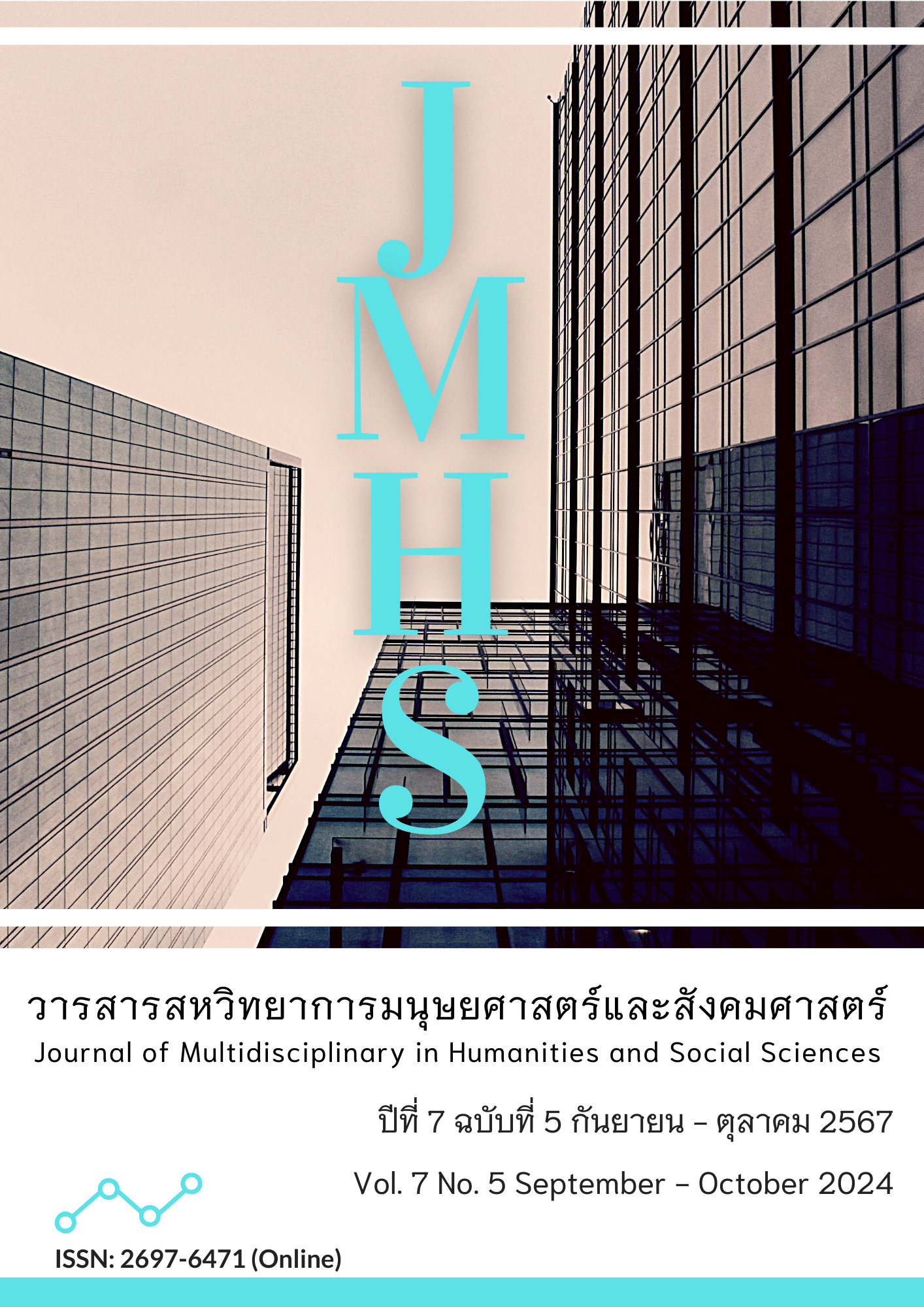นวัตกรรมการบริหารระบบงานรับเหมาช่วงด้วยการบริหารคุณภาพองค์รวม เพื่อยกระดับคุณภาพการให้การบริการ
Main Article Content
บทคัดย่อ
บทความนี้มีวัตถุประสงค์เพื่อ 1) ศึกษาถึงปัจจัยแห่งความสำเร็จในการบริหารระบบงานรับเหมาช่วงด้วยการบริหารคุณภาพองค์รวมฯ 2) พัฒนารูปแบบการบริหารระบบงานรับเหมาช่วงด้วยการบริหารคุณภาพองค์รวมฯ และ 3) นำเสนอนวัตกรรมการบริหารระบบงานรับเหมาช่วงด้วยการบริหารคุณภาพองค์รวมฯ เป็นการวิจัยเชิงคุณภาพและใช้แนวคิด TQM เป็นกรอบการวิจัย กำหนดให้บริษัท โชควิไลทรัพย์ จำกัด เป็นพื้นที่วิจัย มีผู้ข้อมูลสำคัญจำนวน 16 คน โดยใช้วิธีคัดเลือกแบบเจาะจงกลุ่มเป้าหมาย เครื่องมือที่ใช้ในการวิจัยมี 2 ชนิด คือ 1) แบบสัมภาษณ์ และ 2) การสนทนากลุ่ม วิเคราะห์ข้อมูลโดยใช้ 1) การวิเคราะห์เอกสาร 2) การตรวจสอบข้อมูลแบบสามเส้า 3) การวิเคราะห์โดยใช้เทคนิค 6C. และนำข้อมูลที่ได้มาสังเคราะห์แล้วเขียนบรรยายเชิงพรรณนา ผลการวิจัยพบว่า 1) ปัจจัยแห่งความสำเร็จในการบริหารระบบงานรับเหมาช่วงด้วยการบริหารคุณภาพองค์รวมฯ 5 ปัจจัย 2) รูปแบบการบริหารระบบงานรับเหมาช่วงด้วยการบริหารคุณภาพองค์รวมฯ ที่ประกอบด้วย 7 ปัจจัย และ 3) นำเสนอรูปแบบการบริหารจัดการแบบ MAMTQM เพื่อยกระดับการบริหารระบบงานรับเหมาช่วงด้วยการบริหารคุณภาพองค์รวม
ผลลัพธ์ที่ได้จากการวิจัยได้ถูกพัฒนาเป็น MAMTQM Model บนแนวคิดการบริหารคุณภาพองค์รวม ที่สามารถยกระดับการบริหารระบบงานรับเหมาช่วงให้มีประสิทธิภาพมากขึ้นจากการนำนวัตกรรมการสื่อสารเข้ามาบูรณาการ ซึ่งรูปแบบที่ได้สามารถนำไปเป็นต้นแบบการบริหารงานทั้งภาครัฐและเอกชนที่มุ่งหวังจะยกระดับองค์กรให้มีคุณภาพทั้งการทำงานและการบริการ
Article Details

อนุญาตภายใต้เงื่อนไข Creative Commons Attribution-NonCommercial-NoDerivatives 4.0 International License.
ทัศนะและความคิดเห็นที่ปรากฏในวารสาร ถือเป็นความรับผิดชอบของผู้เขียนบทความนั้น และไม่ถือเป็นทัศนะและความรับผิดชอบของกองบรรณาธิการ
เอกสารอ้างอิง
จีระพันธุ์ พูลพัฒน์. (2561, 25 มกราคม). การบริหารเวลา. สืบค้นเมื่อ 30 มีนาคม 2567, จาก http://www.pecerathailand.org/2018/01/660.html
ณัฐวุฒิ แก้วบางพูด. (2554). ความสัมพันธ์ระหว่างภาวะผู้นำการเปลี่ยนแปลงกับวัฒนธรรมองค์กร กรณีศึกษา: เทศบาลนครภูเก็ต. วารสารวิทยบริการ, 22(1), 85-98. สืบค้นจาก https://journal.oas.psu.ac.th/index.php/asj/article/view/187/131
ณัฐวุฒิ เอี่ยมเนตร, สุวลังก์ วงศ์สุรวัฒน์, พระครูปลัดประวิทย์ ทรัพย์อุไรรัตน์, นภัทร์ แก้วนาค, จิดาภา เร่งมีศรีสุข. (2567). นวัตกรรมการสื่อสารเพื่อการส่งเสริมการบริหารจัดการองค์กรภาครัฐและภาคเอกชนในยุคดิจิทัล. วารสารนวัตกรรมการจัดการศึกษาและการวิจัย, 6(1), 291-302. สืบค้นจาก https://so02.tci-thaijo.org/index.php/jemri/article/view/267600
เตชะธร สุขชัยศรี และอนันต์ ธรรมชาลัย. (2560). แนวทางการจัดการที่มีประสิทธิผลของบริษัทรับเหมาช่วงงานสร้างสถานีฐานของระบบโทรศัพท์มือถือในประเทศไทย. วารสารวิจัยและพัฒนา วไลยอลงกรณ์ ในพระบรมราชูปถัมภ์, 12(3), 197-206. สืบค้นจาก https://so06.tci-thaijo.org/index.php/vrurdihsjournal/article/view/107936
นภัทร์ แก้วนาค. (2563). องค์ความรู้การวิจัยอนาคต : ขอบข่ายรัฐประศาสนศาสตร์. พระนครศรีอยุธยา: อยุธยาดีไซน์.
เปรมฤดี ศรีวิชัย, กฤตพัทธ์ ฝึกฝน และ พินทอง ปินใจ. (2556). ความสัมพันธ์ระหว่างการบริหารงานแบบมีส่วนร่วมวัฒนธรรมองค์การเชิงสร้างสรรค์ กับความพึงพอใจในงานตามการรับรู้ของบุคลากรวิทยาลัยพยาบาลบรมราชชนนีพะเยา. วารสารสภาการพยาบาล, 28(3), 95-107. สืบค้นจาก https://he02.tci-thaijo.org/index.php/TJONC/article/view/15751/0
พัชรา พรรณชอบธรรม. (2562). การวางแผนกลยุทธ์: เครื่องมือสู่ความสำเร็จขององค์การ. วารสารมนุษยศาสตร์และสังคมศาสตร์มหาวิทยาลัยราชภัฏเชียงใหม่, 1(2), 55-75. สืบค้นจาก https://so01.tci-thaijo.org/index.php/husocjr/article/view/246110
พุทธชาด ลุนคำ. (2567, 12 มีนาคม). แนวโน้มธุรกิจ/อุตสาหกรรม ปี 2567-2569: ธุรกิจรับเหมาก่อสร้าง. สืบค้นเมื่อ 30 มีนาคม 2567, จาก https://www.krungsri.com/th/research/industry/industry-outlook/construction-construction-Materials
/construction-contractors/io/construction-contractor-2024-2026
วัชรพงศ์ ดีวงษ์. (2563). ปัจจัยทีมีผลต่อความอยู่รอดและความสามารถทางการแข่งขันของผู้ประกอบการรับเหมาก่อสร้างจัดตั้งใหม่ กรณีศึกษาผู้ประกอบการรับเหมาก่อสร้างในเขตเทศบาลนครอุดรธานี. วารสารสถาปัตยกรรม การออกแบบและการก่อสร้าง, 2(1), 71-82. สืบค้นจาก https://so02.tci-thaijo.org/index.php/Jadc/article/view/240763
ศูนย์วิจัยธนาคารออมสิน. (2566, 22 ธันวาคม). ธุรกิจค้าปลีก ปี 2566 และแนวโน้ม ปี 2567. สืบค้นเมื่อ 25 มกราคม 2567, จาก https://www.gsbresearch.or.th/wp-content/uploads/2023/12/รายงานธุรกิจค้าปลีก_inter-1.pdf
สถาบันวิจัยเพื่อการพัฒนาประเทศ. (2556, 21 พฤษภาคม). ลูกจ้างเหมาค่าแรง สะท้อนคุณภาพชีวิตแรงงานไทย. ประชาชาติธุรกิจ. สืบค้นเมื่อ 25 มกราคม 2567, จาก https://tdri.or.th/2013/05/subcontract-tdri/
สรัญญ์ ประทุม. (2562). วัตกรรมการจัดการสื่อสารภายในองค์การเพื่อเสริมสร้างความผูกพันของพนักงานต่อองค์การและประสิทธิผลของการปฏิบัติงานในองค์การชั้นนำของประเทศไทย. วารสารนิเทศศาสตรปริทัศน์, 23(3), 16-31. สืบค้นจาก https://so06.tci-thaijo.org/index.php/jca/article/view/245677
สุนทร พูนพิพัฒน์. (2542). รูปแบบและการประยุกต์ใช้ TQM สำหรับสถานศึกษา. กรุงเทพฯ: สมาคมส่งเสริมเทคโนโลยี.
สุรัสวดี เจียมสุวรรณ. (2558). บทบัญญัติคุ้มครองลูกจ้างรับเหมาค่าแรงจากการเลือกปฏิบัติ: มาตรา 11/1 แห่งพระราชบัญญัติคุ้มครองแรงงาน พ.ศ.2541 แก้ไขเพิ่มเติมโดยพระราชบัญญัติคุ้มครองแรงงาน (ฉบบัที่ 2) พ.ศ.2551. วารสารแรงงานสัมพันธ์ฉบับพัฒนามาตรฐานแรงงาน, 52(1), 13-19.
Burger, T., Ganz, W., Pezzotta, G., Rapaccini, M., & Saccani, N. (2011). Service development for product services: a maturity model and a field research. In 2011 RESER Conference. Productivity of Services Next Gen-Beyond Output/Input. Hamburg: Germany.
Cutlip, S.M. & Center, A.H. (1952). Effective public relations: pathways to public favor. New York: Prentice-Hall.
Hughes, T. P. (1987). The evolution of large technological systems. The social construction of technological systems: New directions in the sociology and history of technology, 82, 51-82.
Macmillan, T. T. (1971). The Delphi Technique. In Paper presented at the annual meeting of the California Junior Colleges Associations Committee on Research and Development, 1-24.
McKeown, Max (2008). The Truth About Innovation. London, UK: Prentice Hall.
Mehra, S., Hoffman, J. M., & Sirias, D. (2001). TQM as a management strategy for the next millennia. International Journal of Operations & Production Management. 21(5/6), 855-876. https://doi.org/10.1108/01443570110390534
Rovinelli, R.J., & Hambleton, R. K. (1977). On the use of content specialists in the assessment of criterion-referenced test item validity. Tijdschrift Voor Onderwijs Research. 2, 49-60. Retrieved from https://eric.ed.gov/?id=ED121845
Tenner, A. R., & DeToro, I. J. (1992). Total quality management: Three steps to continuous improvement. USA: Addison-Wesley Publishing Company.


